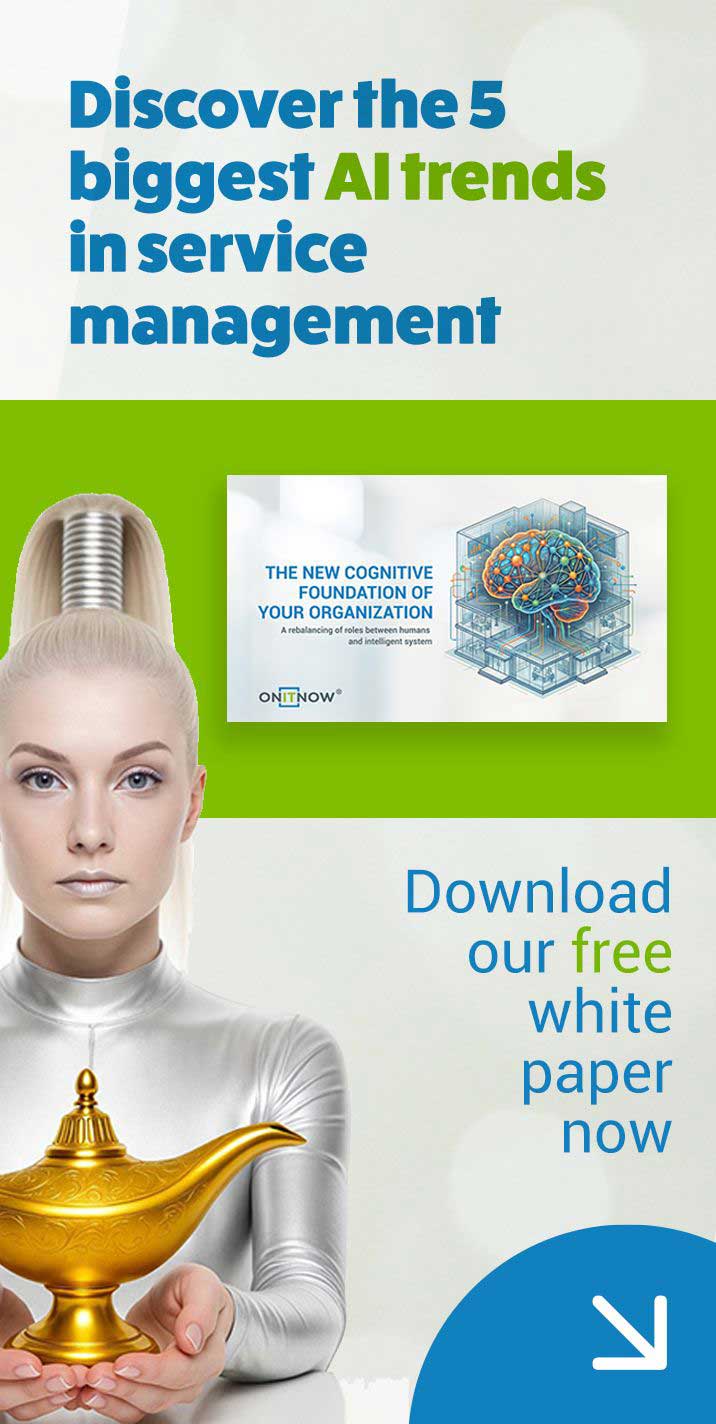Artificial Intelligence (AI) has long been a buzzword, promising to revolutionize industries by increasing efficiency and scalability while enhancing user experience. For organizational decision-makers, the potential of AI to transform IT Service Management (ITSM) is particularly appealing. The big question remains, however: can AI deliver on its promise within the ITSM environment? This article explores how AI can enhance ITSM and which tools are leading the way in realizing this potential.
The Promise of AI in ITSM
IT managers face numerous challenges in managing IT services, from handling the growing complexity of IT environments to meeting users’ increasing expectations for fast issue resolution. AI—particularly generative AI—is emerging as a transformative tool, offering advanced analytics to predict and prevent issues, automate repetitive tasks, and continuously improve processes through adaptive learning.
Efficiency
AI can automate everyday and repetitive tasks that consume significant time and resources. For example, AI bots can manage and resolve tickets faster than human agents, reducing average resolution times by up to 36%. This automation allows IT teams to focus on more strategic initiatives, improving overall productivity and service delivery.
Scalability
One of AI’s key advantages in ITSM is its ability to scale operations efficiently. AI can process vast amounts of data and user interactions simultaneously, enabling ITSM solutions to support growing organizations without a proportional increase in IT staff. AI-driven automation can adapt to fluctuating workloads, ensuring consistent service levels even during peak periods.
User Experience
Generative AI enhances user experience by providing instant, accurate responses to common questions via AI-powered chatbots and virtual assistants. These tools offer 24/7 support, enabling users to resolve issues quickly without waiting for human intervention. Faster response times and personalized support lead to greater user satisfaction and an improved overall perception of IT services.
Can AI Deliver on Its Promise?
While AI holds significant potential, successful implementation in ITSM is not without its challenges. A recent Gartner report highlights that defining and measuring business value remains a key obstacle to AI adoption. Organizations must address these challenges to truly harness the power of AI.
Key Strategies for Successful AI Implementation
Building AI Value: To gain buy-in and drive adoption, it is crucial to clearly articulate the benefits of AI initiatives. This involves crafting a narrative that resonates with stakeholders’ priorities and highlights both financial and non-financial advantages.
Defining a Value Hypothesis: Establishing a clear hypothesis about how an AI initiative will improve specific KPIs helps maintain focus on delivering tangible business value. This should occur early in the project lifecycle.
Creating an Action Plan: AI benefits don’t happen automatically. A detailed plan outlining required actions, process changes, and resource allocation is essential for translating AI outcomes into business value.
Testing the Value Hypothesis: Rigorous testing, including methods such as A/B testing, helps validate the AI initiative’s impact on business KPIs. Iterative testing ensures the project remains on track to deliver the expected benefits.
Monitoring Leading and Lagging KPIs: Ongoing monitoring of both leading indicators (which predict future performance) and lagging indicators (which assess past performance) is essential for managing and realizing AI benefits over time.
Leading AI-Powered ITSM Tools
Several ITSM tools are making significant strides in integrating AI to fulfill its promise. Among them, Xurrent stands out with comprehensive AI-driven features:
Xurrent: Service-Oriented AI
Xurrent offers a unique combination of service orientation, a scalable data model, and true multi-tenant architecture, making it a leader in AI-based service management:
Generate summaries of requests and comments: AI helps agents quickly get up to speed on requests with lengthy comment histories.
Create knowledge articles: AI can generate knowledge articles from service requests with a single click.
Enhance the knowledge base: AI improves knowledge articles based on newly resolved incidents.
Automatically translate requests and comments: AI supports global organizations by facilitating communication across language barriers.
How onITnow Helps Realize the AI Promise
onITnow stands out in the ITSM space by providing comprehensive support for AI implementation in service management. They offer a range of services—including consulting, implementation, and ongoing management—to ensure organizations can fully leverage AI capabilities. Their expertise with tools like Xurrent ensures seamless integration and optimal performance of AI-driven ITSM solutions.
Services Offered by onITnow
Consulting: onITnow provides expert advice to help organizations select the right ITSM tools to match their specific needs and goals.
Implementation: They manage the integration of new tools with existing processes, ensuring a smooth transition and minimal disruption.
Support and Management: onITnow provides ongoing support to ensure continuous optimization of ITSM solutions, enabling organizations to adapt to evolving challenges and opportunities.
By partnering with onITnow, organizations can navigate the complexities of AI implementation and achieve the desired improvements in efficiency, scalability, and user experience.
Conclusion
The potential of AI in ITSM is vast, promising greater efficiency, scalability, and an enhanced user experience. Realizing these benefits, however, requires a strategic approach—including crafting compelling value stories, defining clear value hypotheses, detailed action planning, rigorous testing, and ongoing KPI monitoring. Tools like Xurrent are leading the way, demonstrating that the promise of AI in ITSM is not just a futuristic concept, but an achievable reality. For decision-makers, understanding and leveraging these AI capabilities—with the support of experts like onITnow—can transform IT service delivery and position their organizations for success in the digital age


